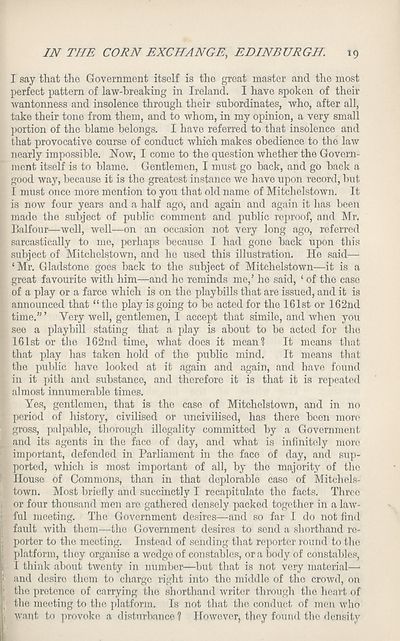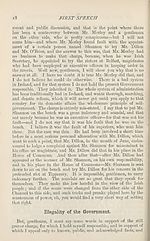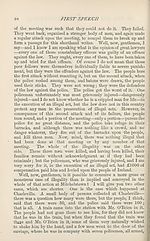Download files
Complete book:
Individual page:
Thumbnail gallery: Grid view | List view

IN THE CORN EXCHANGE, EDINBURGH. 19
I say that the Government itself is the great master and the most
perfect pattern of law-breaking in Ireland. I have spoken of their
wantonness and insolence through their subordinates, who, after all,
take their tone from them, and to whom, in my opinion, a very small
portion of the blame belongs. I have referred to that insolence and
that provocative course of conduct which makes obedience to the law
nearly impossible. How, I come to the question whether the Govern-
“ ment itself is to blame. Gentlemen, I must go back, and go back a
| good way, because it is the greatest instance we have upon record, but
I must once more mention to you that old name of Mitchelstown. It
is now four years and a half ago, and again and again it has been
I made the subject of public comment and public reproof, and Mr.
Balfour—well, well—on an occasion not very long ago, referred
[ sarcastically to me, perhaps because I had gone back upon this
subject of Mitchelstown, and he used this illustration. He said—
‘Mr. Gladstone goes back to the subject of Mitchelstown—it is a
: great favourite with him—and he reminds me,’ ho said, ‘ of the case
of a play or a farce which is on the playbills that are issued, and it is
announced that “ the play is going to be acted for the 161st or 162nd
time.’” Very well, gentlemen, I accept that simile, and when you
see a playbill stating that a play is about to be acted for the
161st or the 162nd time, what does it mean? It means that
I that play has taken hold of the public mind. It means that
I the public have looked at it again and again, and have found
I in it pith and substance, and therefore it is that it is repeated
I almost innumerable times.
| Yes, gentlemen, that is the case of Mitchelstown, and in no
1 period of history, civilised or uncivilised, has there been more
lj; gross, palpable, thorough illegality committed by a Government
^ and its agents in the face of day, and what is infinitely more
p important, defended in Parliament in the face of day, and sup-
K ported, which is most important of all, by the majority of tbo
It House of Commons, than in that deplorable case of Mitchels-
town. Most briefly and succinctly I recapitulate the facts. Three
I or four thousand men are gathered densely packed together in a law-
!' ful meeting. The Government desires—and so far I do not find
fault with them—the Government desires to send a shorthand re¬
porter to the meeting. Instead of sending that reporter round to the
i platform, they organise a wedge of constables, or a body of constables,
I think about twenty in number—but that is not very material—
\ and desire them to charge right into the middle of the crowd, on
: the pretence of carrying the shorthand writer through the heart of
the meeting to the platform. Is not that the conduct of men who
. want to provoke a disturbance 1 However, they found the density
I say that the Government itself is the great master and the most
perfect pattern of law-breaking in Ireland. I have spoken of their
wantonness and insolence through their subordinates, who, after all,
take their tone from them, and to whom, in my opinion, a very small
portion of the blame belongs. I have referred to that insolence and
that provocative course of conduct which makes obedience to the law
nearly impossible. How, I come to the question whether the Govern-
“ ment itself is to blame. Gentlemen, I must go back, and go back a
| good way, because it is the greatest instance we have upon record, but
I must once more mention to you that old name of Mitchelstown. It
is now four years and a half ago, and again and again it has been
I made the subject of public comment and public reproof, and Mr.
Balfour—well, well—on an occasion not very long ago, referred
[ sarcastically to me, perhaps because I had gone back upon this
subject of Mitchelstown, and he used this illustration. He said—
‘Mr. Gladstone goes back to the subject of Mitchelstown—it is a
: great favourite with him—and he reminds me,’ ho said, ‘ of the case
of a play or a farce which is on the playbills that are issued, and it is
announced that “ the play is going to be acted for the 161st or 162nd
time.’” Very well, gentlemen, I accept that simile, and when you
see a playbill stating that a play is about to be acted for the
161st or the 162nd time, what does it mean? It means that
I that play has taken hold of the public mind. It means that
I the public have looked at it again and again, and have found
I in it pith and substance, and therefore it is that it is repeated
I almost innumerable times.
| Yes, gentlemen, that is the case of Mitchelstown, and in no
1 period of history, civilised or uncivilised, has there been more
lj; gross, palpable, thorough illegality committed by a Government
^ and its agents in the face of day, and what is infinitely more
p important, defended in Parliament in the face of day, and sup-
K ported, which is most important of all, by the majority of tbo
It House of Commons, than in that deplorable case of Mitchels-
town. Most briefly and succinctly I recapitulate the facts. Three
I or four thousand men are gathered densely packed together in a law-
!' ful meeting. The Government desires—and so far I do not find
fault with them—the Government desires to send a shorthand re¬
porter to the meeting. Instead of sending that reporter round to the
i platform, they organise a wedge of constables, or a body of constables,
I think about twenty in number—but that is not very material—
\ and desire them to charge right into the middle of the crowd, on
: the pretence of carrying the shorthand writer through the heart of
the meeting to the platform. Is not that the conduct of men who
. want to provoke a disturbance 1 However, they found the density
Set display mode to:
![]() Universal Viewer |
Universal Viewer | ![]() Mirador |
Large image | Transcription
Mirador |
Large image | Transcription
| Antiquarian books of Scotland > Politics & government > Political speeches in Scotland in 1890 > (23) |
|---|
| Permanent URL | https://digital.nls.uk/126568566 |
|---|
| Description | Thousands of printed books from the Antiquarian Books of Scotland collection which dates from 1641 to the 1980s. The collection consists of 14,800 books which were published in Scotland or have a Scottish connection, e.g. through the author, printer or owner. Subjects covered include sport, education, diseases, adventure, occupations, Jacobites, politics and religion. Among the 29 languages represented are English, Gaelic, Italian, French, Russian and Swedish. |
|---|

